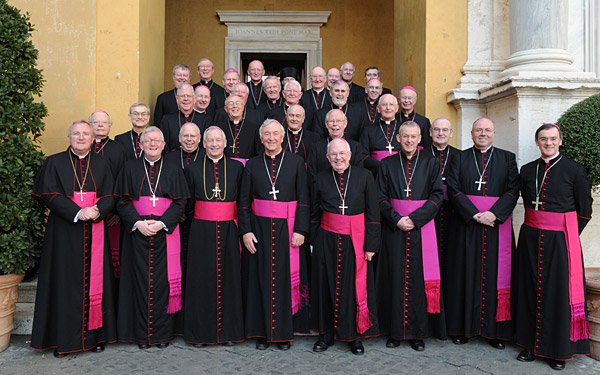There are more than 5000 Bishops-Far more than the Pope can know personally
 There are more than 5000 Bishops-Far more than the Pope can know personally.
There are more than 5000 Bishops-Far more than the Pope can know personally.
I know absolutely nothing about the Diocese of Ahiara in Nigeria, and nothing in this column should imply that I understand what is going on there or that I have any specific brilliant ideas to sort out a situation that has clearly become both fraught and painful. But what I have read has made me think about how totally bizarre is our current system for appointing bishops.
There are slightly more than 5,000 bishops in the Catholic Church – far more than the Pope can possibly know personally. Last year 193 new bishops were consecrated. That is very nearly four a week, from five continents, speaking God alone knows how many languages. Each one is appointed personally and directly by the Pope, and he is free to select anyone he likes – a right not fully established until it was included in the Code of Canon Law in 1917 and confirmed at the Second Vatican Council.
In 1983, canon law created structures that allowed bishops to nominate candidates, but the Pope is not required to appoint from their recommendations – and indeed sometimes does not. To assist the Pope in this crucial but obviously impossible task a nuncio is sent along to the local church to “consult” – except it is not consulting in any normal sense of the word, because we have no right to know who he has talked to or what has been said. (“We” here is not just the laity but the whole local church, including the clergy and the other bishops in the national conference.) The nuncio then draws up a terna – a list of three names – and may even express a preference, but the Pope is under no obligation whatsoever to pay any attention to any of this.
Most emphatically this was not the practice of the early Church. Until the fourth century bishops were nominated and elected (or sometimes simply acclaimed) by the popular vote of the local faithful – even women got to vote, until they were gradually excluded from the process. St Cyprian, hardly a flaky liberal, was committed to an electoral system because he believed it prevented “unworthy people” becoming bishops: the locals always know their man.
The newly elected bishops’ colleagues seem very seldom to have objected to the people’s choice – after all, they were chosen in the same way – except when heresy was suspected, and even then they had to persuade the local church – lay and ordained – to do the necessary.
One image often appealed to was that a bishop was “married” to his diocese (which is why a bishop seeking to transfer to another diocese would be disapproved of – it was seen as adultery); another was that a bishop was “shepherd of the flock”. In the light of these traditional images our present practice looks dangerously like a “forced” or “arranged” marriage, which of course the Church repudiates.
Moreover, “the shepherd knows his sheep and the sheep know their shepherd”. The flock can recognise the shepherd’s voice. It’s simple. People should not have a bishop they do not know (or do not want) foisted upon them. It’s a question of transparency, of subsidiarity, of natural justice, of good order and – above all – of love.
Perhaps we should look more closely at the system by which the members of the Coptic Church elect their Pope. The Copts have had a Pope a good deal longer than we have; they have survived great persecution; and they model their system on Acts 1:15-26 (read it attentively: it is not just the Apostles who appoint Matthias, but the “whole company”).
It works like this. A candidate must have met the requirements set out in the by-laws and must be endorsed by six bishops or by 12 of the 24 members of the (elected) General Lay Council of the Church. A nominations committee, formed of nine bishops appointed by the Holy Synod and nine laypersons elected by the General Community Council, narrows the field to half-a-dozen candidates. Each diocese then contributes 12 electors to an electoral college whose votes lead to a short list of three. The name of each candidate is written on a slip of paper, which is then inserted into a box and placed on the altar of St Mark’s Cathedral in Cairo during a Sunday Mass. A five-year-old child from the congregation draws one piece of paper from the box. The name that is written on it is the new pope.
Everyone, lay and ordained, does everything in an orderly and prayerful way. Then they let the Holy Spirit choose. Perhaps we should try something more like that.
Sara Maitland is a novelist and writer.


 Votes : 0
Votes : 0









